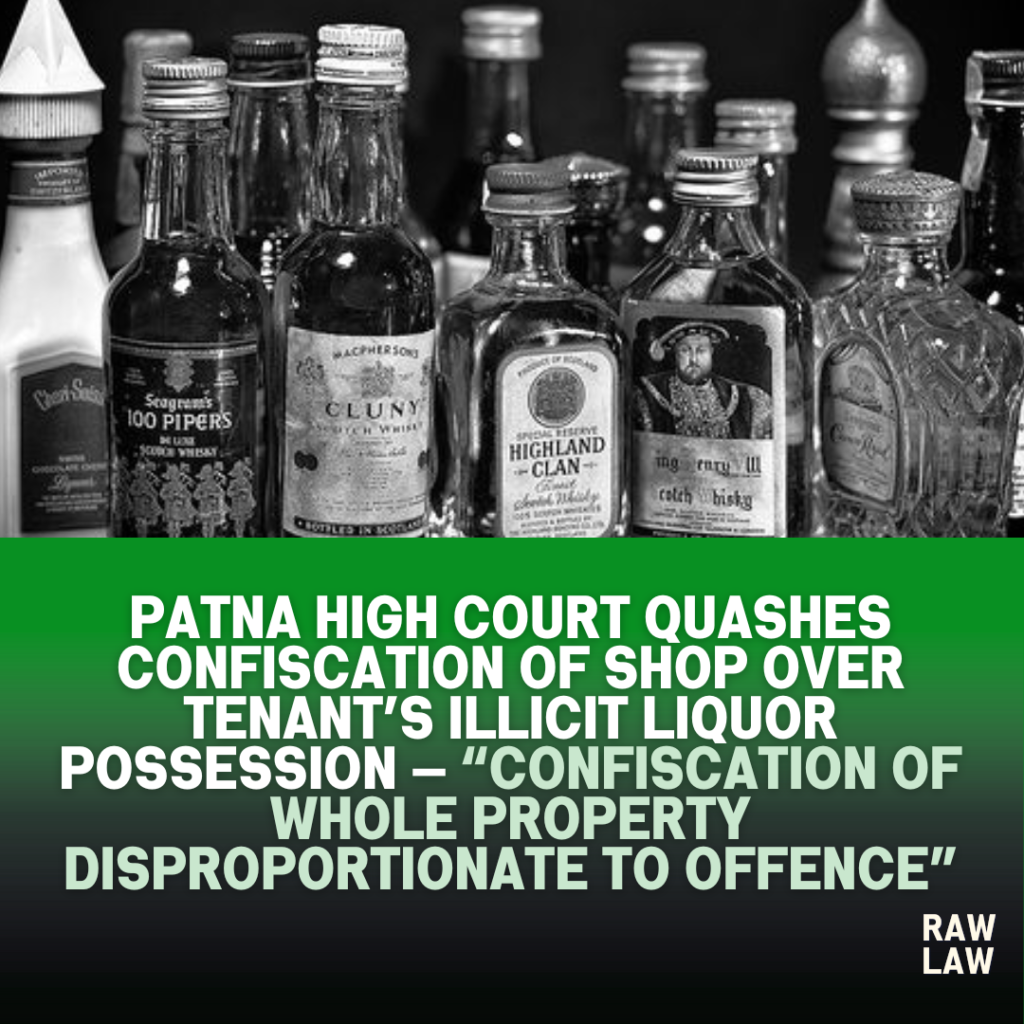Court’s Decision
The Patna High Court allowed the writ petition, setting aside the orders of the confiscation authority, the appellate authority, and the revisional authority, which had confiscated the petitioner’s shop following recovery of illicit liquor from a tenant’s possession. The Court held that while the petitioner, as the property owner, bore some responsibility to ensure her premises were not misused, confiscation of the entire property for recovery of 23.59 litres of liquor was disproportionate. Relying on its earlier decision in Sunita Sinha v. State of Bihar, the Court directed immediate release of the shop to the petitioner.
Facts
The petitioner, a widow, owned a shop constructed on her ancestral property. In 2013, her brother-in-law rented the shop to one Rabi Kumar for operating “New Star Communication.” On 9 September 2022, police recovered 23.59 litres of illicit liquor from the shop, leading to registration of an FIR under the Bihar Prohibition and Excise (Amendment) Act, 2022. The Senior Superintendent of Police recommended confiscation, and the District Collector ordered seizure and sealing of the shop on 14 January 2023.
The petitioner contended that she lived 10 km away, had no involvement in the tenant’s business, and rent transactions were handled by her brother-in-law. Her appeals before the Excise Commissioner and revision before the Secretary, Prohibition, Excise & Registration Department, were dismissed. She then approached the High Court seeking quashing of the confiscation and release of her property.
Issues
- Whether confiscation of an entire property was justified when illicit liquor was recovered from a tenant’s shop without the owner’s direct involvement.
- Whether the authorities erred by not considering the petitioner’s defence and lack of direct control over the tenant’s activities.
Petitioner’s Arguments
The petitioner argued that she had no role in the tenant’s illegal activities. The shop was rented by her brother-in-law under a valid agreement since 2013, and she had no direct dealings with the tenant. She emphasized her status as a widow living far from the shop, making day-to-day monitoring impractical. She claimed the authorities failed to consider her explanation and imposed an excessive penalty by confiscating her entire property for a tenant’s actions.
Respondent’s Arguments
The State maintained that the recovery of illicit liquor from the shop established misuse of the premises. As the owner, the petitioner bore responsibility to prevent illegal activities on her property. They contended she failed to provide evidence showing the liquor was stored without her knowledge and thus, the confiscation orders were validly passed on the available material.
Analysis of the Law
The Court examined the Bihar Prohibition and Excise (Amendment) Act, 2022, which empowers confiscation of premises used for illegal liquor trade. However, it stressed that such powers must be exercised proportionately, especially where ownership is distinct from operational control. The Court noted that the petitioner’s role was limited to ownership and she neither managed nor directly supervised the shop.
The Court invoked the constitutional principle of proportionality, ensuring that penalties are commensurate with the gravity of the offence, especially under Article 226 jurisdiction.
Precedent Analysis
The Court relied on its earlier ruling in Sunita Sinha v. State of Bihar (C.W.J.C. No. 17894 of 2022), where it had ordered release of a landlord’s property seized after recovery of liquor from a tenant’s godown. In that case, the Court held that confiscating an entire property without direct involvement of the owner was unjustified. Applying the same reasoning here, the Court found the present matter “squarely covered” by Sunita Sinha.
Court’s Reasoning
The Bench acknowledged that the petitioner, as owner, had some obligation to monitor her premises, but given her personal circumstances and absence of direct control, holding her liable for the tenant’s acts to the extent of losing her property was excessive. The recovery of 23.59 litres of illicit liquor, while a violation of law, did not justify permanent deprivation of the entire property. The Court emphasized balancing deterrence against undue hardship to innocent owners.
Conclusion
The confiscation orders dated 14 January 2023, 19 June 2023, and 2 September 2024 were quashed. The authorities were directed to release the shop forthwith to the petitioner. The writ petition was allowed.
Implications
This judgment reinforces the principle that property owners cannot be penalized disproportionately for tenants’ offences absent evidence of active involvement. It clarifies that while owners have a duty to ensure lawful use of their premises, the sanction of confiscation must align with proportionality and fairness. The decision also strengthens landlord protections in Bihar’s prohibition enforcement regime.
Cases Referred
- Sunita Sinha v. State of Bihar — Directed release of a godown confiscated after recovery of liquor from a tenant’s possession, holding confiscation disproportionate without proof of the owner’s complicity. Applied directly to grant relief in this case.
FAQs
Q1: Can a landlord’s property be confiscated if illicit liquor is found with a tenant?
Yes, under the Bihar Prohibition and Excise Act, but confiscation must be proportionate and supported by evidence of the landlord’s knowledge or involvement.
Q2: What principle did the Patna High Court apply to quash the confiscation?
The Court applied the constitutional principle of proportionality, ruling that seizure of an entire property for a tenant’s offence was excessive without proof of the owner’s complicity.
Q3: How does this judgment affect other property owners in Bihar?
It sets a precedent protecting landlords from disproportionate penalties in prohibition cases, especially when they can prove lack of control or involvement in the offence.



